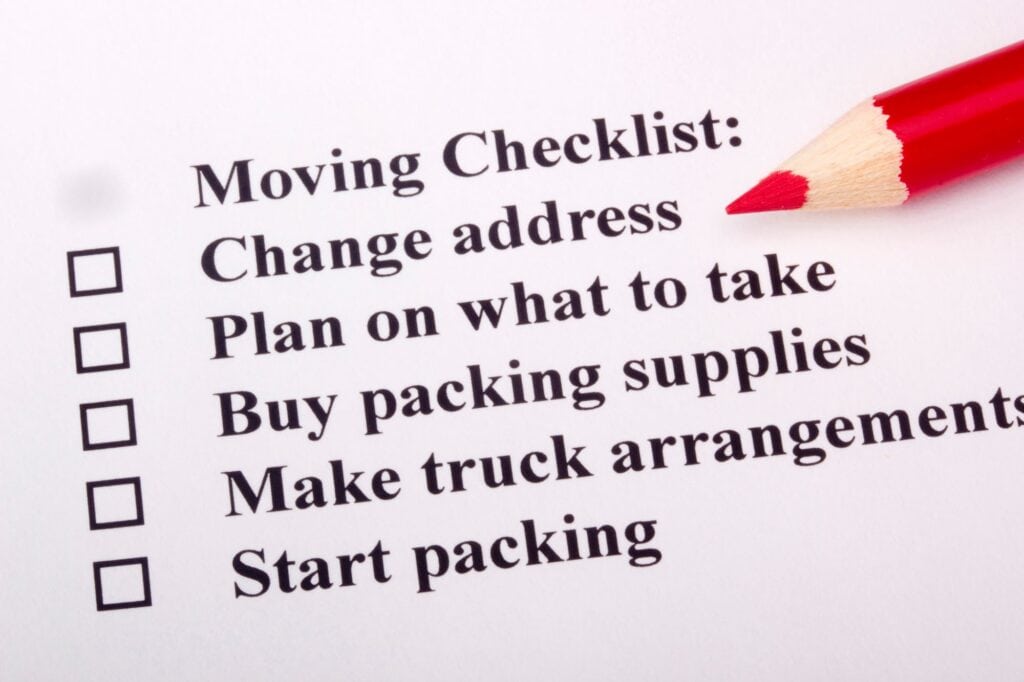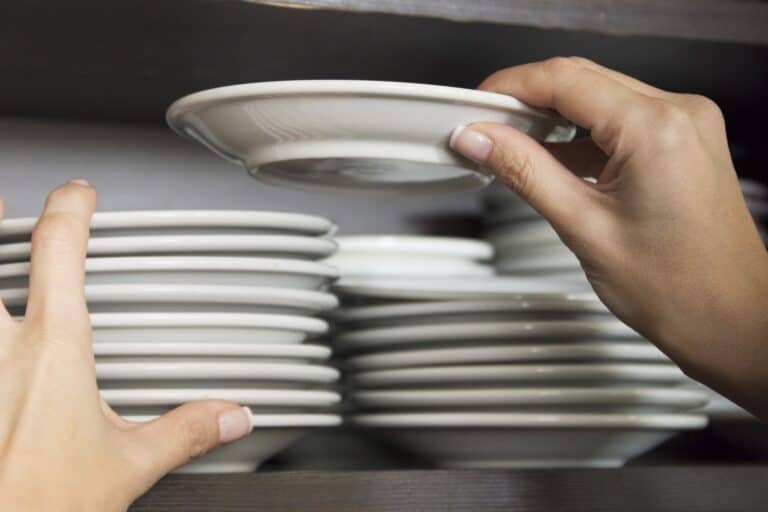Need a plan to make your move stress-free? This guide will show you how to create a moving checklist that covers all the crucial steps for a smooth transition. From early planning to setting your moving date and final preparations, you’ll find practical tips to help you stay organised throughout the process.
Key Takeaways
- Start planning your move early, set the moving date, and create a detailed budget to ensure a smooth relocation process.
- Organise and secure important documents, including school records, medical records, and legal documents, to avoid misplacement during the move.
- Notify relevant parties, such as utility companies, government agencies, and personal contacts, about your change of address to maintain continuity in services and communications.
Start Planning Early
The early bird doesn’t just catch the worm; it also enjoys a seamless move. Start the moving process months ahead by creating a moving house checklist that provides a head start. This will help ensure all tasks are completed and every detail is accounted for. From the moment you start packing, this head start will be your ally, safeguarding your peace of mind and your wallet.
Understand the value of thorough planning, as it paves the way for a stress-free moving experience. With the luxury of time, you can research moving companies, gather free boxes, and even sell or donate items, all of which can save you money and reduce the load on a moving day.
So why wait? Begin packing the moment your new abode is confirmed, and watch as your moving journey unfolds with grace and ease.
Set Your Moving Date
Setting your moving date is like reaching the peak of your planning process. It’s the pivotal point around which all other arrangements orbit. Whether you’re dealing with conveyancers or landlords, confirming the exact date provides a concrete goal for your packing and travel arrangements. Renters may find a silver lining in the potential for a staggered move, offering the flexibility to shuttle between old and new spaces.
Once this cornerstone is set, inform your chosen moving company to ensure their availability aligns with your big day. Keep in mind, that the moving date is more than just a marked day; it’s the central focus of your moving checklist.
Create a Moving Budget
Money matters, especially when it comes to moving house. Establishing a moving budget early on serves as a financial guide for your relocation. Consider every expense, from:
- truck rental
- packing supplies
- moving company fees
- insurance
- cleaning services
and keep a vigilant eye on your spending. Being vigilant can help avoid unexpected costs on moving day and your moving checklist can help guide your financial decisions to maintain your budget and peace of mind.
Organise Your Important Documents
Amidst the whirlwind of boxes and bubble wrap, there lies a sanctuary of sanity: your important documents. These documents serve as the link between your past and future life. Birth certificates, social security cards, and legal paperwork should be gathered and guarded like precious jewels.
Ensure that passports, mortgage documents, and tax records are not only accessible during the move but also protected from the chaos. A portable file box with a secure latch is recommended to keep these important papers safe during your move.
Collect School Records
Children’s school records are the scrolls of their academic history, and as such, they demand special attention. Collecting official transcripts and test scores is a task that should be done with care, ensuring your child’s educational continuity. Don’t forget to secure those glowing letters of recommendation, which can be as golden as a key to the city when enrolling in a new school.
If private or charter schools are on the horizon, be prepared with additional documentation like work samples – they can make all the difference in charting a smooth academic transition.
Secure Medical Records
Your health cannot take a backseat during the moving process. Here are some steps to ensure a seamless transition:
- Secure copies of your medical records well in advance, liaising with your GP practice and hospital trust.
- Ensure you have your immunisation records and recent medical histories.
- These documents are not just important; they’re a chapter in your family’s health narrative that your new medical providers will need to continue the story.
- Don’t leave these behind – your well-being is non-negotiable.
Compile Legal Documents
Legal documents are the anchors of your personal administration. Having your passports, car titles, and pension plan details at the ready will make your move a straightforward affair. In the shuffle of boxes and packing tape, ensure that these critical papers are compiled in a place that’s easily accessible. After all, you wouldn’t want the crucial elements of your identity and ownership getting lost in the fray.
Notify Relevant Parties
Broadcasting your move to the world (or at least the relevant parts of it) ensures that your life’s services follow you to your new abode. From the warmth of your gas fire to the cool breeze of your air conditioner, utility companies need to be informed. Don’t let your government benefits take a detour; the Department of Work and Pensions and Inland Revenue should be high on your to-do lists. And, as you navigate this transition, ensure your National Insurance and Council Tax records reflect your new chapter.
RECOMMENDATION
Don’t forget to uphold your civic responsibility – remember to update your details on the Electoral Roll.
Contact Utility Companies
As you prepare to leave your current home in Harrow, make sure to inform your utility companies. Give them the heads up about your move date and arrange for essential services like your internet connection to follow you to your new frontier. Handle those final utility readings with care; they’re the closing statements of your resource usage at your old address.
Make sure to take care of these simple but important details, whether it’s the last use of a light bulb or a final flush of a toilet.
Update Government Agencies
Updating your address with government agencies such as the DVLA is more than a bureaucratic box-ticking exercise; it’s ensuring that your life’s legalities are in lockstep with your new address. The simple act of setting up a postal redirect with Royal Mail can be a lifesaver, capturing those stray letters and parcels that might otherwise be lost in the postal abyss. These updates are the unglamorous yet indispensable threads in the tapestry of a well-executed move. Don’t forget to visit your local post office to ensure a smooth transition.
Inform Friends and Family
Your friends and family are the chorus to the song of your life, and as such, they deserve to know when and where you’re setting up your next stage. A mass email or social media post can effectively announce your move. For those you’re closest to, consider sending a change of address card that also invites them to your future housewarming party.
After all, sharing your new journey in a new house with family members and other loved ones is what makes a house a home.
Declutter and Downsize
Before you begin packing, take a moment to declutter and downsize. This is not just about making room for new possessions; it’s about making room for new experiences. A thorough clear-out can be liberating, allowing you to say goodbye to the superfluous and hello to the essential. It’s a process that not only saves you time and effort but also can be a cathartic prelude to the next chapter of your life.
Organising your belongings can help you clearly envision what you need in your future home – and what you don’t.
Sort Through Belongings
Sorting through belongings can be a trip down memory lane, but remember, it’s the future you’re packing for. Embrace the Three-Box Method to keep, discard, or store your items, and tackle each room with a decisive spirit.
Minimising duplicates, particularly in the kitchen, can significantly declutter your move and your mind. This step isn’t just about moving house; it’s about refining your lifestyle.
Sell or Donate Items

Selling or donating items is an act of moving house and moving forward. Organise a garage sale or donate to charity to not only lighten your load but also to enrich the lives of others. Whether it’s a well-loved sofa or a stack of forgotten books, let your leftovers become someone else’s treasures, and feel the dual satisfaction of decluttering and giving back.
Dispose of Hazardous Materials
In the process of moving, hazardous materials are the items that need special attention. From paint to chemicals, ensure you’re striking the right note with local disposal regulations. Safety is paramount, so take advantage of home pick-up services or designated drop-off locations for these materials.
By doing so, you not only protect your family and movers but also play your part in preserving the environment.
Start Packing Strategically
As the moving day draws near, it’s time to start packing strategically. Here are some tips to help you:
- Begin with items you seldom use and work your way to the daily essentials.
- Label each box with precision and care.
- Turn the chaos of packing into an organised symphony of boxes that will harmonise perfectly with your new home.
Packing strategically can make unpacking easier and help you settle into your new home with less stress and more order.
Gather Free Boxes
Why spend on boxes when you can gather them for free? Here are some places to find sturdy containers for your move:
- Local stores, from liquor to bookshops, often have boxes that have completed their first act and are ready for an encore in your moving drama.
- Community groups and social media can be great resources for finding free packing materials.
- Recycling centres are also treasure troves for boxes that won’t cost you a dime.
These packing boxes are more than just containers for your items; they’re integral to your moving day preparation, ticking all your boxes for a smooth and organised move while ensuring all the boxes are well taken care of.
Label All Boxes
Labelling all boxes might seem like a tedious task, but it’s the compass that will guide you through the unpacking process. Each scribble, each sticker, and each note is a directive that will help you navigate the sea of cardboard that awaits you at your destination. Use colour-coded labels for an extra layer of organisation, and soon enough, you’ll be unpacking with the efficiency of a seasoned traveller. With the right label boxes, your moving experience will be much smoother.
Pack an Essentials Box
Consider the essentials box as your survival kit for the first night. Pack it with the daily necessaries – from toothbrushes to tea bags – and keep it within arm’s reach. This box is your lifeline, ensuring you won’t be rummaging through mountains of boxes just to find your pyjamas.
It’s the first box in and the first box out, the beacon of normalcy in the exciting chaos of moving day.
Arrange Moving Services
Choosing the right moving services is like casting the perfect ensemble for a play. Here are some steps to help you make the right choice:
- Research at least three companies to compare costs and services.
- Consider the type of service that will make your transition a blockbuster hit, be it full-service or labor-only.
- Scrutinise the fine print and ensure that your chosen company is licensed and insured.
This team will handle your valuable possessions during the move, so make your choice carefully.
Research Moving Companies
Researching moving companies in Harrow is detective work that pays off. Check customer reviews and inquire about hidden fees to avoid any unwelcome plot twists. Remember, these are the guardians of your goods, the stewards of your move, so their reputation should be as solid as the boxes they’ll carry.
Reserve a Moving Truck
Reserving a moving truck requires strategic planning and foresight. Reserve your chariot at least six weeks ahead to ensure availability for your grand departure. Size matters, so choose a truck that can accommodate all your belongings in one go, preventing the need for a return journey.
With the keys in your hand and the journey ahead, your move to your new property is almost guaranteed.
Consider Moving Containers
For those who prefer to move at their own rhythm, moving containers offer a ballet of flexibility and convenience. They’re delivered to your doorstep, allowing you the freedom to pack at your leisure and explore various storage options if needed. With companies providing affordable solutions, the stage is set for a stress-free move that fits both your timetable and your budget.
Final Preparations Before Moving Day
The eve of your move is a time for final preparations, a crescendo of activity that sets the stage for a seamless transition. Here are some tasks to complete:
- Confirm the moving day logistics with your moving company.
- Ensure utilities are scheduled to switch over.
- Secure professionals to disconnect your appliances.
- Iron out any parking or access issues at your new abode.
This is the preliminary phase of your move, where all aspects come together in sync.
Confirm Travel Arrangements
Verify your travel arrangements, ensuring any flights or accommodations are booked and ready for your moving concerto. If pets are part of your family ensemble, arrange their care to ensure they’re not left improvising on the day of the move. Your journey should be as smooth as a well-tuned melody, with every note falling into place.
Clean Your Current Property

Cleaning your current property before the curtain falls is not just a courtesy; it’s an act of closure. A final sweep through the home, polishing the windows and mirrors, can ensure you leave on a high note. Protect your floors with carpet protectors to maintain the stage for the new occupants.
By leaving your old home clean, you exit gracefully, ready for your next adventure.
Conduct a Final Walkthrough
A final walkthrough is the denouement of your time in your old home. Double-check every nook and cranny to ensure no beloved item is left behind or forgotten in the wings. Record final utility readings and pass them on to the suppliers, as these are the closing lines of your residency.
A thorough final walkthrough ensures that every detail has been attended to before your departure.
Moving Day Checklist
The day has arrived, and it’s time to initiate your moving day plan. As the director of this production, make sure to:
- Ensure your floors are protected
- Secure valuable items and important documents
- Supervise the movers with clear instructions
- Have your essentials box ready for the first night in your new home.
It’s a day of action, anticipation, and the start of something new.
Protect Your Floors
As the movers parade in and out, safeguard your floors from scuffs and scratches with protective materials. A clean exit is just as important as a grand entrance, so mop hard floors to a shine and leave behind a stage worthy of an encore.
This final act of care shows your respect for your former home.
Supervise Movers
On this eventful day, managing the movers involves:
- Clear direction
- Good communication
- Keeping the lines of communication open
- Guiding the movers with precision
- Ensuring that every box and piece of furniture finds its spotlight in the correct room
- Your presence as the guiding light that ensures the performance unfolds without a hitch.
Unpack Essentials First
When the dust settles and the movers take their final bow, turn your attention to the essentials box. This is the prologue to your new life, the box that contains a few items – the immediate necessities to anchor you in your new environment. Unpack these items first to create a sense of home amidst the boxes and furniture waiting to be staged.
Unpack these items first to create a sense of home amidst the boxes and furniture …
This first step sets the stage for an organised and calm unpacking process.
Summary
As the final curtain closes on your moving journey, take a moment to reflect on the orchestration of your well-planned move. From the early beginnings of setting a moving date and budget to the final act of unpacking essentials, each step was a note in the symphony of your transition. Embrace the new beginnings that await, and let the harmony of an organised move play the soundtrack to your fresh start.
Frequently Asked Questions
How early should I start planning my move?
You should start planning your move at least two months in advance to ensure you have enough time to create a checklist, pack, and arrange services.
What should be included in my essentials box?
You should include toiletries, a change of clothes, phone chargers, medications, cleaning products, and basic kitchen supplies to cover your needs for the first night. These essentials will help you settle into your new place comfortably.
How do I choose the right moving company?
To choose the right moving company, research at least three licensed and insured options, compare services and costs, and read customer reviews for reliability.
Is it necessary to label all my boxes?
Yes, labelling all your boxes with their contents and designated rooms is crucial for an organised unpacking process. It helps you find things easily and saves time in the long run.
What should I do with items I no longer need?
You should consider selling or donating items you no longer need by organising a garage sale or donating to local charities. It’ll help you declutter and benefit others.







